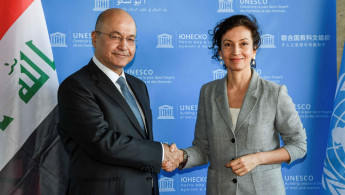Iraq's president in Paris to discuss fate of French IS detainees
Saleh will have a working lunch Monday with French President Emmanuel Macron. They are expected to discuss the case of French citizens who traveled to fight with IS in Iraq and Syria and are now being detained by the US-backed Kurdish-led Social Democratic Forces (SDF).
The SDF has urged countries such as the UK and France to take back their citizens. France's official position states that French "terrorist" fighters "must be tried wherever they committed their crimes", according to the French foreign affairs ministry.
The French presidency said Paris intends to reaffirm its full support to Iraq to face challenges regarding security, stability, inclusive governance, and the country's reconstruction.
US President Donald Trump called earlier this month for countries to take back and try their own nationals. Germany and France issued strong rebuttals to his call. "At this stage France is not responding to [Trump's] demands," French Justice Minister Nicole Belloubet told France 2.
The government of France, which accounts for the largest number of European jihadists in Syria, has said it would stick to its current policy of dealing with fighters on a case-by-case basis.
Read also: Grandparents hope to repatriate French children suffering in Syrian camps
As Syrian-Kurdish forces prepare to defeat IS and take over its last territory in Baghouz, they are struggling with the intake of thousands of civilians fleeing the area.
"The numbers of foreign fighters and their relatives that we are holding is increasing drastically," Kurdish foreign affairs official Abdel Karim Omar told AFP. "Our current infrastructure can't handle the mass influx."
The SDF, struggling to cope with the escalating humanitarian situation in which thousands have ended up in destitute camps lacking basic provisions, wishes for foreign fighters to be repatriated to their country of origin.
"As thousands of foreigners flee [IS'] crumbling caliphate, the burden which is already too heavy for us to handle is getting even heavier," SDF spokesman Mustefa Bali said on Twitter late Saturday, using an Arabic acronym for IS.
"This will remain as the biggest challenge awaiting us unless governments take action and fulfil their responsibilities for their citizens," he said.
The case of Shamima Begum, a British woman who moved to IS-occupied Syria when she was a schoolgirl, has brought the controversy of what to do with citizens who want to return home - particularly minors - into news headlines.





 Follow the Middle East's top stories in English at The New Arab on Google News
Follow the Middle East's top stories in English at The New Arab on Google News
![The UAE is widely suspected of arming the RSF militia [Getty]](/sites/default/files/styles/image_330x185/public/2024-11/GettyImages-472529908.jpg?h=69f2b9d0&itok=Yauw3YTG)
![Netanyahu furiously denounced the ICC [Getty]](/sites/default/files/styles/image_330x185/public/2024-11/GettyImages-2169352575.jpg?h=199d8c1f&itok=-vRiruf5)
![Both Hamas and the Palestinian Authority welcomed the ICC arrest warrants [Getty]](/sites/default/files/styles/image_330x185/public/2024-11/GettyImages-2178351173.jpg?h=199d8c1f&itok=TV858iVg)